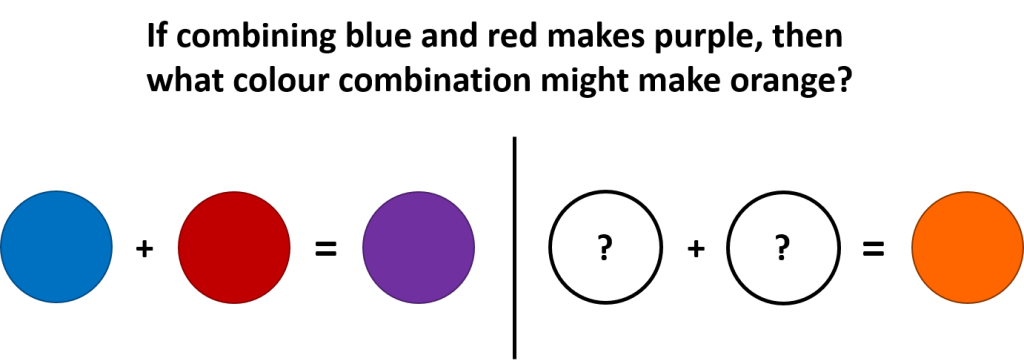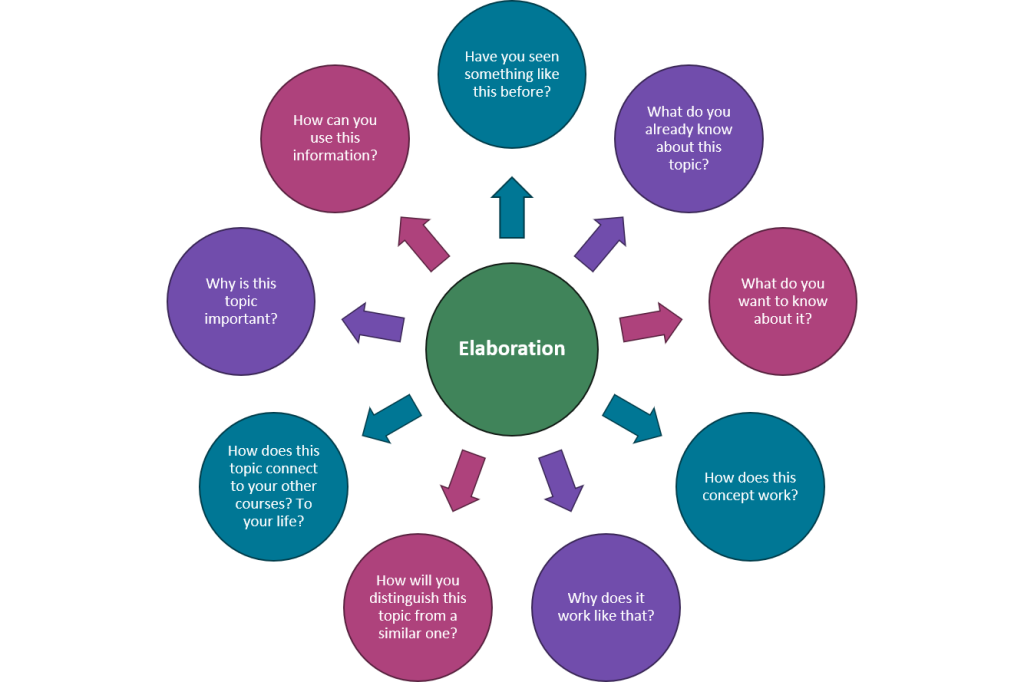Exploring Elaboration

Exploring Elaboration
Elaboration uses detailed explanations and descriptions to further illustrate new information and make meaningful connections between concepts. Through elaboration, new information is combined with prior knowledge to increase students’ understanding of information.
Learning Outcomes
After completing this module, you will be able to:
- Explain the principle of elaboration
- Describe how elaboration improves learning
- Understand the barriers to using elaboration
- Demonstrate how to use interactive learning tools to support elaboration
Understanding Elaboration
Elaboration involves digging below the surface of a concept to strengthen and extend understanding through explanation, description, and connection. An instructor’s visual materials will often include brief written, salient points about a topic, which the instructor verbally expands upon during the lesson. This verbal expansion is where elaboration starts. Students are then tasked with taking the information provided, adding details, and connecting that information with their prior knowledge, experiences, and everyday life.
Elaboration can be accomplished through visualization, storytelling, and elaborative interrogation (asking probing questions). The key to elaboration is to create meaning and relevance for the concept. Ask “how”, “if/then” and “why” questions to prompt deep thinking about the topic, and then provide feedback to ensure students have clear understanding. Including lower-level recall and application questions will help students gauge their knowledge and understanding of the topic, but also including higher-level questions will require students to extend their understanding through critical thinking (evaluation, analysis, and synthesis).

Ask yourself these questions to gain a deeper understanding of a topic:

Elaboration – Video
The following two-and-a-half minute video is an introduction to elaboration. It explores what elaboration is and how it can support students in their learning. Feel free to include this short video into your own courses to guide students as they explore effective learning techniques. You can find this video at the following link: Tactic 4: Elaboration Video
The following are some interesting and creative ways to use this video:
- Present it in class and ask your students to come up with questions to elaborate on a course topic, either as a connection activity or at the end of a lesson
- Embed this video in a note-taking template or review page that includes elaborative questions.
Elaboration – Infographic
You may want to share this infographic with your students to help them understand how they can use elaboration for learning:
Attribution- Creative Commons-NonCommercial-NoDerivs by The Learning Scientists
Barriers to Elaboration
Within this section we explore some roadblocks that can prevent students from engaging in this particularly learning technique. These can be used in a number of ways:
- establish a reflective checklist for students to assist them in assessing their previous habits and methods of studying
- support discussions about progress and next steps with students
- as a means of feedback to support students while they build their competency with learning
Resistance to Using Elaboration
- Elaboration can be time-consuming for students to make connections between the new information and their existing knowledge.
- People may think they are elaborating when they are merely restating existing information or simply creating examples.
- Students without the core learning behind the concept may struggle to elaborate. Providing an elaborative framework of consistent question will help students become more comfortable with extending their thinking in this way.
- Some concepts are difficult to elaborate on the spot, so it is recommended that educators develop their elaborative story, illustration, etc. ahead of class.
Challenges Students May Face Using Elaboration
- Instructors may not use stories or analogies that resonate with all students.
- Students may focus on surface details, or the incorrect aspect of the concept or context being elaborated on. Be sure to always draw the students back to the primary concept.
- Students may not know how to ask the right types of questions. Modelling elaboration by providing a question bank at the beginning of a unit, an elaborative framework or other prompts can help students to identify the types of details and connections they are seeking.
- Students may restate the original information in different terms without expanding on it. For elaboration to be effective, students need to build connections between what they know already and the new information. This requires them to recognize when they don’t understand something and be proactive in obtaining any additional information required for clarity and understanding.
References
Photography on this page used with permission from the Durham College Online Photo Database.
Boser, U. (n.d.). Science of learning: Research meets practice – elaboration. The Learning Agency Lab. https://www.the-learning-agency-lab.com/learning-strategies/elaboration/
Dunlosky, J. (2013). Strengthening the Student Toolbox: Study Strategies to Boost Learning. American Educator, 37(3), 12–21. https://files.eric.ed.gov/fulltext/EJ1021069.pdf
Dunlosky, J., Rawson, K.A., Marsh, E.J., Nathan, M.J., & Willingham, D.T. (2013). Improving students’ learning with effective learning techniques: Promising directions from cognitive and educational psychology. Psychological Science in the Public Interest, 14(1), 4-58. https://doi.org/10.1177/1529100612453266
Karpicke, J. D., & O’Day, G. M. (in press). Elements of effective learning. In M. J. Kahana & A. D. Wagner (Eds.), Oxford Handbook of Human Memory, Volume II: Applications. Oxford University Press. https://learninglab.psych.purdue.edu/downloads/inpress_Karpicke_ODay_Oxford_Handbook.pdf
The Learning Scientists. (n.d.). Elaboration. The Learning Scientists. https://www.learningscientists.org/elaboration
Weinstein, Y., Madan, C.R. & Sumeracki, M.A. (2018). Teaching the science of learning. Cognitive Research: Principles and Implications, 3(2). https://doi.org/10.1186/s41235-017-0087-y
Weinstein Y., & Smith, M. (2016, July 7). Learn to study using… elaboration. The Learning Scientists. https://www.learningscientists.org/blog/2016/7/7-1
© Durham College. All rights reserved.

